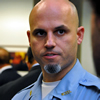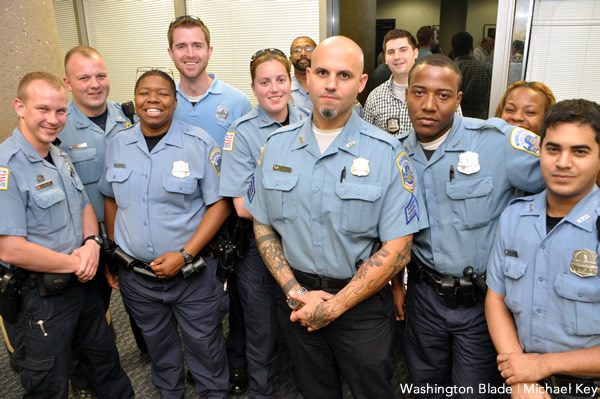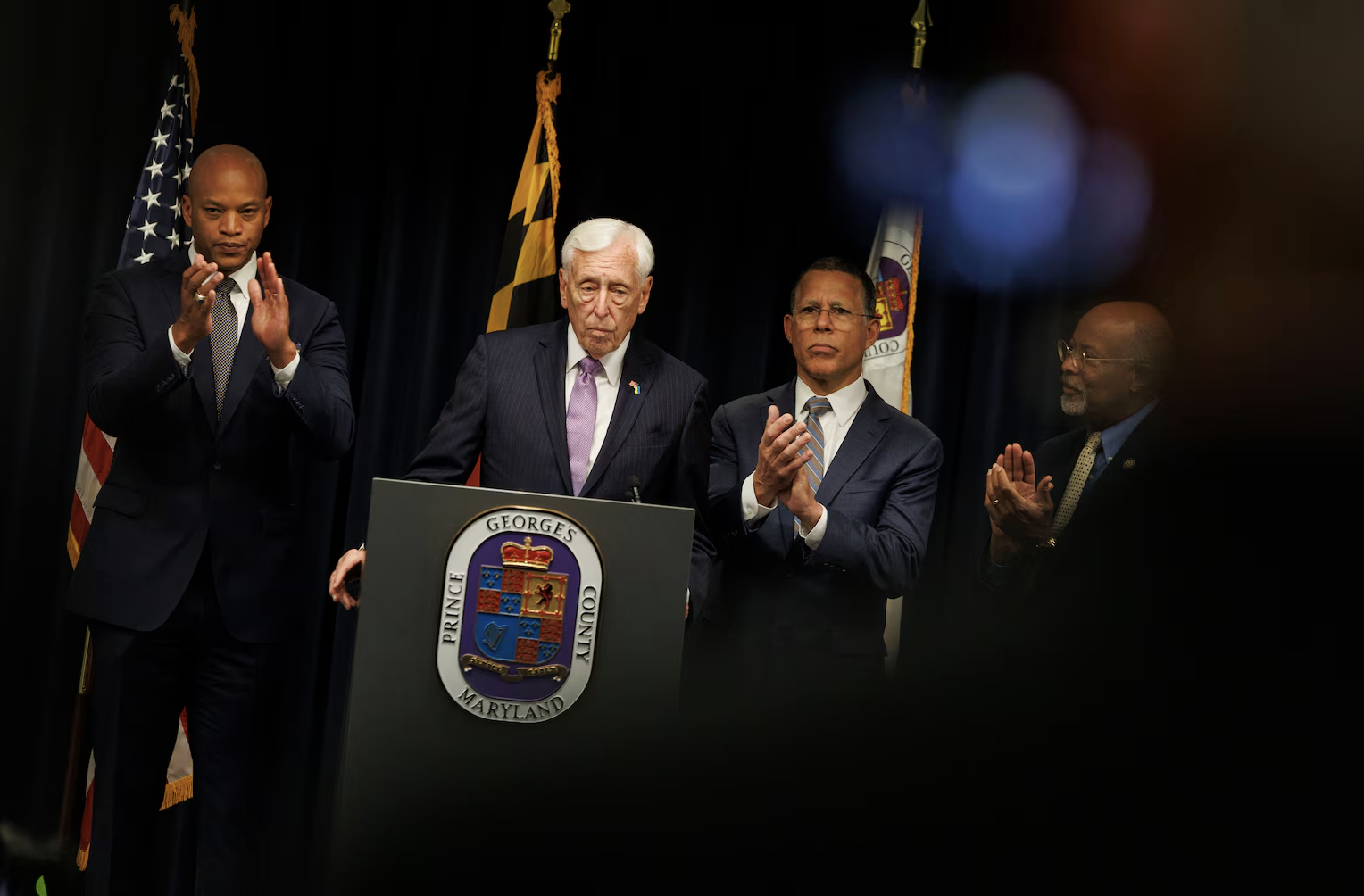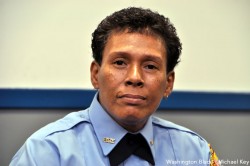Local
Police, fire officials meet community
Pledge of support after spate of anti-LGBT crimes


Members of the GLLU and affiliate officers joined fire and EMS officials in meeting the LGBT community at a public forum on Wednesday. (Blade photo by Michael Key)
More than a dozen affiliate members of the D.C. Police Department’s Gay and Lesbian Liaison Unit joined police and Fire and Emergency Medical Services Department officials Wednesday night for a Public Safety Open House for the LGBT community.
The event, organized by the Mayor’s Office of GLBT Affairs, gave activists and community members a chance to mingle with the GLLU’s full-time and affiliate officers before the start of a discussion, where police and Fire Department officials answered questions about community concerns.
Activists attending the open house at the city’s Reeves Municipal Building at 14th and U streets, N.W., praised police and fire officials for establishing policies calling for reaching out to the LGBT community and prohibiting anti-LGBT discrimination against police officers, firefighters and EMS workers as well as against members of the public.
But several attendees, including transgender activists Ruby Corado and Jason Terry and gay activist Rick Rosendall, said the supportive actions and attitudes of high-level police officials often don’t filter down to the behavior and actions of rank and file officers.
They pointed to a number of recent incidents involving police officers that have shaken the LGBT community. In one case, several officers refused to take a report of an incident in which four lesbians were assaulted by two male attackers who called them anti-gay names. The incident occurred outside the Columbia Heights Metro station.
D.C. Police Chief Cathy Lanier said the incident is under investigation and the officers could be fired depending on the findings of the investigation.
In another incident that shocked LGBT activists, an off-duty D.C. police officer fired his service revolver at three transgender women and two male friends who were sitting in a car in Northwest D.C. Two of the women and one of the men suffered non-life-threatening gunshot wounds. The officer was arrested and charged with assault with a dangerous weapon.
Transgender activist Jeri Hughes said at the open house that police have not adequately investigated other assaults against transgender women, including one recent case where a trans woman was attacked on a Metro Bus.
Hughes said that while the rate of closing homicide cases in D.C. by making an arrest is 80 percent, the rate of solving homicides involving transgender victims is 20 percent.
On hand to answer questions about these and other concerns were Paul Quander, the D.C. Deputy Mayor for Public Safety, who oversees the Police and Fire and EMS departments; D.C. Fire Chief Kenneth Ellerbe; Deborah Hassan, an EMS technician who serves as the Fire and EMS Department’s LGBT community liaison; Capt. Edward Delgado, director Police Department Special Liaison Division, which oversees the GLLU; and Sgt. Carlos Mejia, supervisor of the GLLU.
Also speaking at the event was Melissa Hook, director of the city’s Office of Victim Services, which assists crime victims.
Quander opened the discussion by inviting the LGBT community to inform him about issues of interest.
“I work for you,” he said. “I work for the citizens of the District of Columbia. And I need to meet your needs. I need to know what your issues are…and I have to ensure that everyone is treated equally, that everyone has a voice.”
With D.C. gay activist Peter Rosenstein serving as moderator, several LGBT activists responded by reiterating what they said were longstanding concerns. Among them is the view that Lanier weakened the GLLU by reducing the number of officers at its headquarters office, making it less responsive to the community at a time when anti-LGBT hate crimes are on the rise.
Lanier has said a police funding reduction made it necessary to reduce the GLLU headquarters staff from seven officers and a full-time sergeant to four officers and a part-time sergeant. But she has said the affiliate GLLU officer program she started has resulted in the designation of 46 GLLU affiliate officers, who work out of each of the department’s seven police districts. According to Lanier, the affiliates have greatly expanded the reach of the GLLU, enabling it to respond to all sections of the city at all times of the day and night.
Most LGBT activists and the local group Gays and Lesbians Opposing Violence say they support the affiliate program but believe the direction and leadership of the GLLU must be set by the full-time officers working out of the unit’s headquarters, which is located in Dupont Circle.
Under Lanier’s officer affiliate program, the affiliate members of the GLLU and separate liaison units working with the Latino, Asian, and deaf and hard of hearing communities devote most of their time to their regular patrol duties in the police district to which they are assigned. Upon receiving special training for liaison unit duties, the affiliates are on call to respond to LGBT-related crimes in their respective districts.
Mejia serves as supervisor of the GLLU and the Latino Liaison Unit. Although activists have praised his work in managing the GLLU they say the unit’s effectiveness is diminished by not having a full-time supervisor.
Hassan, the Fire and EMS Department’s LGBT liaison, is less known in the LGBT community than GLLU officers.
In an interview before the start of the open house forum, she told the Blade that all firefighters and EMS workers receive diversity training that includes information about the LGBT community. She said she is unaware of any recent complaints by members of the LGBT community about discriminatory treatment by firefighters or EMS workers.
Hassan said she is out as a lesbian at work. She noted that at her request, she was given an official name badge for her uniform that identifies her as an EMS worker and “LGBT Liaison.”
“We’re here for the community, whether you’re straight or gay,” she said during the open house discussion.
Rosenstein, in introducing Delgado at the open house, said he was pleased that Delgado returned to his job as director of the Special Liaison Division. Rosenstein was referring to a decision by Chief Lanier earlier this year to transfer Delgado to another division and replace him at the liaison division post with a civilian police official who had no direct experience in police work such as investigating crimes.
Some activists criticized Lanier for making the change, saying Delgado had worked well with the LGBT community and appeared more knowledgeable on issues likely to come up in the operation of the Special Liaison Division.
“I’m not going to sit here and say we’ve done everything correctly because we’re all human and we all have faults,” Delgado said. “But you can rest assured that the Metropolitan Police Department stands behind the members of the LGBT community because we actually believe that all members of the community should be protected.”
Jeffrey Richardson, director of the Office of GLBT Affairs, said his office plans to hold more public safety open house events for the LGBT community in the future. He and Rosenstein thanked the GLLU officers for attending the event, including those who came during their off-duty hours.
Richardson noted that the names of all affiliate GLLU officers are posted on the Police Department website on the GLLU page. The listing includes e-mail contact information for each of the officers and shows the police district to which they are assigned, enabling members of the LGBT community to identify the GLLU affiliate officer serving the area where they live.
Virginia
Gay Va. State Sen. Ebbin resigns for role in Spanberger administration
Veteran lawmaker will step down in February

Alexandria Democrat Adam Ebbin, who has served as an openly gay member of the Virginia Legislature since 2004, announced on Jan. 7 that he is resigning from his seat in the State Senate to take a job in the administration of Gov.-Elect Abigail Spanberger.
Since 2012, Ebbin has been a member of the Virginia Senate for the 39th District representing parts of Alexandria, Arlington, and Fairfax counties. He served in the Virginia House of Delegates representing Alexandria from 2004 to 2012, becoming the state’s first out gay lawmaker.
His announcement says he submitted his resignation from his Senate position effective Feb. 18 to join the Spanberger administration as a senior adviser at the Virginia Cannabis Control Authority.
“I’m grateful to have the benefit of Senator Ebbin’s policy expertise continuing to serve the people of Virginia, and I look forward to working with him to prioritize public safety and public health,” Spanberger said in Ebbin’s announcement statement.
She was referring to the lead role Ebbin has played in the Virginia Legislature’s approval in 2020 of legislation decriminalizing marijuana and the subsequent approval in 2021of a bill legalizing recreational use and possession of marijuana for adults 21 years of age and older. But the Virginia Legislature has yet to pass legislation facilitating the retail sale of marijuana for recreational use and limits sales to purchases at licensed medical marijuana dispensaries.
“I share Governor-elect Spanberger’s goal that adults 21 and over who choose to use cannabis, and those who use it for medical treatment, have access to a well-tested, accurately labeled product, free from contamination,” Ebbin said in his statement. “2026 is the year we will move cannabis sales off the street corner and behind the age-verified counter,” he said.
Maryland
Steny Hoyer, the longest-serving House Democrat, to retire from Congress
Md. congressman served for years in party leadership

By ASSOCIATED PRESS and LISA MASCARO | Rep. Steny Hoyer of Maryland, the longest-serving Democrat in Congress and once a rival to become House speaker, will announce Thursday he is set to retire at the end of his term.
Hoyer, who served for years in party leadership and helped steer Democrats through some of their most significant legislative victories, is set to deliver a House floor speech about his decision, according to a person familiar with the situation and granted anonymity to discuss it.
“Tune in,” Hoyer said on social media. He confirmed his retirement plans in an interview with the Washington Post.
The rest of this article can be found on the Baltimore Banner’s website.
District of Columbia
Kennedy Center renaming triggers backlash
Artists who cancel shows threatened; calls for funding boycott grow

Efforts to rename the Kennedy Center to add President Trump’s name to the D.C. arts institution continue to spark backlash.
A new petition from Qommittee , a national network of drag artists and allies led by survivors of hate crimes, calls on Kennedy Center donors to suspend funding to the center until “artistic independence is restored, and to redirect support to banned or censored artists.”
“While Trump won’t back down, the donors who contribute nearly $100 million annually to the Kennedy Center can afford to take a stand,” the petition reads. “Money talks. When donors fund censorship, they don’t just harm one institution – they tell marginalized communities their stories don’t deserve to be told.”
The petition can be found here.
Meanwhile, a decision by several prominent musicians and jazz performers to cancel their shows at the recently renamed Trump-Kennedy Center in D.C. planned for Christmas Eve and New Year’s Eve has drawn the ire of the Center’s president, Richard Grenell.
Grenell, a gay supporter of President Donald Trump who served as U.S. ambassador to Germany during Trump’s first term as president, was named Kennedy Center president last year by its board of directors that had been appointed by Trump.
Last month the board voted to change the official name of the center from the John F. Kennedy Memorial Center For The Performing Arts to the Donald J. Trump And The John F. Kennedy Memorial Center For The Performing Arts. The revised name has been installed on the outside wall of the center’s building but is not official because any name change would require congressional action.
According to a report by the New York Times, Grenell informed jazz musician Chuck Redd, who cancelled a 2025 Christmas Eve concert that he has hosted at the Kennedy Center for nearly 20 years in response to the name change, that Grenell planned to arrange for the center to file a lawsuit against him for the cancellation.
“Your decision to withdraw at the last moment — explicitly in response to the Center’s recent renaming, which honors President Trump’s extraordinary efforts to save this national treasure — is classic intolerance and very costly to a non-profit arts institution,” the Times quoted Grenell as saying in a letter to Redd.
“This is your official notice that we will seek $1 million in damages from you for this political stunt,” the Times quoted Grenell’s letter as saying.
A spokesperson for the Trump-Kennedy Center did not immediately respond to an inquiry from the Washington Blade asking if the center still planned to file that lawsuit and whether it planned to file suits against some of the other musicians who recently cancelled their performances following the name change.
In a follow-up story published on Dec. 29, the New York Times reported that a prominent jazz ensemble and a New York dance company had canceled performances scheduled to take place on New Year’s Eve at the Kennedy Center.
The Times reported the jazz ensemble called The Cookers did not give a reason for the cancellation in a statement it released, but its drummer, Billy Hart, told the Times the center’s name change “evidently” played a role in the decision to cancel the performance.
Grenell released a statement on Dec. 29 calling these and other performers who cancelled their shows “far left political activists” who he said had been booked by the Kennedy Center’s previous leadership.
“Boycotting the arts to show you support the arts is a form of derangement syndrome,” the Times quoted him as saying in his statement.
-

 National3 days ago
National3 days agoWhat to watch for in 2026: midterms, Supreme Court, and more
-

 District of Columbia4 days ago
District of Columbia4 days agoTwo pioneering gay journalists to speak at Thursday event
-

 a&e features4 days ago
a&e features4 days agoQueer highlights of the 2026 Critics Choice Awards: Aunt Gladys, that ‘Heated Rivalry’ shoutout and more
-

 Colombia4 days ago
Colombia4 days agoBlade travels to Colombia after U.S. forces seize Maduro in Venezuela




















